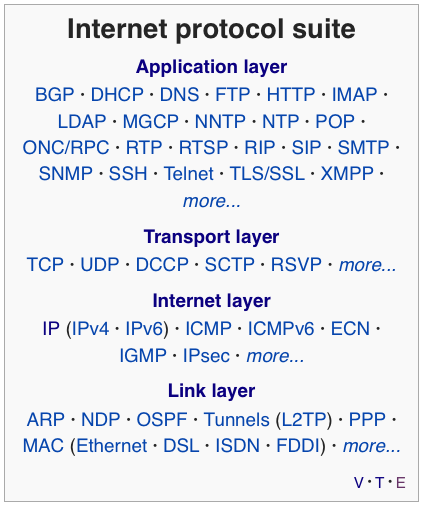Open Protocols and Internet Abstraction Hierarchy
This page is
ready for review (reviewed by bh).
-
I've added the FTYD and editted the "Internet Abstraction Hierarchy
"take note" box since BH's review. --MF
- reviewed again by bh. Where has DNS gone?? This is important to the AP standard.
So far, you've learned about three Internet protocols:
- HTTP: HyperText Transfer Protocol—the protocol that your computer uses when accessing an HTML web site
- IP: Internet Protocol—the protocol that manages routing (finding paths to distant computers)
- TCP: Transmission Control Protocol—the protocol that assures reliable transmission of data
There are a lot of protocols! Here's a picture from Wikipedia:
You don't have to know about all of these!

These are all open standards, which means that anyone can look up their details and build them into new hardware and software without getting permission. (For example, here is the IPv4 specification, but don't read it now.)
(Before the Internet, there were several different network protocols that were secrets belonging to particular manufacturers. So if you had a particular brand of computer or router, it could talk only to other computers of the same brand.)
Open protocols are another reason why the Internet is scalable.
The Internet is probably the largest and most complicated artifact in human history. And it relies on cooperation. Just think:
- You can send email to someone in a country that's considered an enemy of your country (from the US to Iran, for example).
- An engineer at Microsoft can read a web page at Apple even though their companies are competitors.
- Your T-Mobile cell phone can talk to your friend's Verizon phone.
Despite some governments' attempts to censor the net, the big picture is one of strong cooperative spirit!
Internet Abstraction Hierarchy
There are billions of devices connected to the Internet, and hundreds of different kinds of devices: laptops, tablets, phones, refrigerators, handheld credit card readers that the waiter brings to your table at the restaurant, and so on.
How do they all know how to talk to each other? The Internet was designed with several levels of abstraction. Here's an only slightly simplified picture:
Internet Abstraction Hierarchy
| Application Protocols (like HTTP) |
| Transport Protocols (like TCP) |
| Internet Protocols (like IPv4 and IPv6) |
| Network Interface Hardware (like WiFi) |
These layers are are least abstract at the bottom and most abstract at the top.
![]() Review and improve your understanding of the abstractions of the internet:
Review and improve your understanding of the abstractions of the internet:
